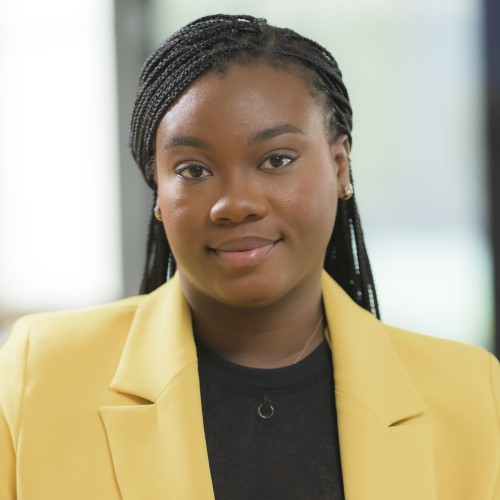Successfully navigating the Full-time MBA application process
Full-time MBA participants provide key insights and advice to help you build a strong application and maximise your chances of admission success.
 Abiola Ayanleye
Abiola Ayanleye
Define your career goals
Defining your career goals is the first and most important thing for me. Knowing this will help you select an MBA programme that aligns with your objectives. Next, decide on the type of MBA programme that suits your lifestyle and work commitments.
Location
Another thing you need to consider is what location works for you. Do you prefer a specific region or city? Are you comfortable with the weather? Do you have family and friends that you need to be close to? Can you maintain your current work role? The UK was the perfect choice for me. Choosing a place only six hours away with an hour’s time difference from where my business runs sounded perfect.
Institution
When you have picked your location, the next thing to consider would be the institution. You can research the reputation and ranking of the business school and MBA programme. While rankings aren't everything, they can provide insight into the programme's quality and standing in the business world. More importantly, you must ensure that a recognised accreditation body, such as AACSB, AMBA, or EQUIS, accredits the MBA programme. Accreditation indicates that the programme meets specific quality standards.
If you are going to a highly rated business school, you should check if you meet the admission requirements, which include standardised tests (such as the GMAT or GRE), work experience, and prerequisites. Other things to consider concerning the institution would be diversity and inclusion, the alumni network, the experience of faculty members, class size, culture, and values.
Financing
Finally, you should evaluate the tuition, fees, and living expenses associated with the programme. Calculate the potential return on investment (ROI) for your MBA by comparing the programme's cost to the expected increase in earning potential after graduation. You can also explore scholarships to help finance your MBA.
Kieran Boland
Method and Length of Study
The first thing to consider is if you want to take time out of your career and study full-time or continue to work and complete it part-time. Course lengths and delivery methods will vary, so it is worth considering how you can fit this around your life and the trade-off between the levels of commitment required, the financial cost, and the time it will take to complete your studies. Each has pros and cons, so it is worth considering the impact of your work-life balance and the potential benefits of each. Personally, I always found it helpful to discuss these options with family and friends to help frame my thinking.
Ranking and Reputation
Always an important consideration; achieving an MBA from a highly-ranked business school can open many doors for you. Some great sources for research are the Financial Times, QS (Quacquarelli Symonds) and Corporate Knights. These are great tools to compare schools and the different programmes they offer, bearing in mind full-time, online and executive MBA programmes are all ranked differently. It’s also an ideal source for more holistic reputational research by providing various articles, blogs and further reading to glean more information about each programme.
Location
This will have a huge influence on your network and the ease with which you can connect to specific industries. If you have your eye on living and working in a certain part of the world, then undertaking an MBA close to that location or a particular employer/industry could be beneficial. For me personally, Warwick offered the perfect balance between a campus university experience and maintaining strong links to London, giving me broader, more varied networking opportunities.
Curriculum
It is absolutely worth looking more in-depth at the exact curriculum for an MBA. Whilst there will be common themes amongst courses, slight differences or areas of focus will appeal to people looking to switch sectors or specific subjects that align with their career goals. Download brochures and look at how each course is structured and what modules they offer MBA candidates.
Personal Touch
At the end of the day, choosing an MBA is an extremely personal decision. There is no correct or perfect answer that encompasses everyone’s needs. My final recommendation would be to reach out to alumni, current students, and the recruitment teams. You will gain more from a 30-minute chat than you might from a day of research. Use LinkedIn and university websites to connect with people and have those conversations; it could be your first step in a life-changing experience
Jo Esebame
Flexibility – part-time or online programme?
The choice of an MBA programme depends on individual circumstances. Full-time programmes allow for dedicated study, while part-time or online programmes offer flexibility for those with work, family, or other commitments. The programme duration varies, with full-time programmes typically taking one year, and part-time or online programmes extending over a more flexible timeframe. The choice of programme duration depends on personal preferences, career goals and the ability to balance academic and professional commitments.
How to pick an institution
Selecting the right institution involves considering various factors. While rankings provide insights into academic excellence, it's essential to evaluate programme structure, faculty expertise and alumni networks. One should consider an institution's commitment to diversity and inclusion, as exposure to a diverse student body enriches the learning experience. Additionally, location plays a role; proximity to business hubs offers networking and internship opportunities.
Financing
Financing an MBA can be a substantial investment and it is crucial, but various options are available. Based on my experience, many students explore employer sponsorship, where companies support employees' education. Scholarships, both merit-based and need-based, are valuable resources. I would advise that prospective students explore scholarship opportunities offered by the institution, industry associations, or external organisations. It would be beneficial to investigate financial aid options, student loans, potential for internships or payment plans to determine the most suitable option for one’s circumstances.
Modules
The MBA programme typically comprises a mix of core and elective modules. The core modules cover fundamental business topics, while electives allow specialisation. The core modules offered in the MBA programme vary, but commonly includes core courses in finance, marketing, strategy and leadership. In my choice of elective modules, I evaluated the practical application, industry relevance and any experiential learning opportunities. Most importantly, I considered the programme's curriculum alignment with my personal and career goals to ensure that I have a well-rounded education.
Equality, diversity and inclusion
Consideration of equality, diversity and inclusion was crucial for me in selecting the WBS MBA programme. A diverse student body enriches the learning experience by exposing one to varied perspectives. Warwick Business School’s inclusive MBA programme provides a platform for diverse perspectives, which fosters a rich and collaborative learning environment. My choice of WBS was based on my perception of the institution's commitment to fostering an inclusive environment, diversity in faculty and student recruitment and how the institution promotes these values in both academic and extracurricular activities.
To find out more about our Full-time MBA and to have an informal chat with a member of team, you can book an in-person or online 1-2-1.






 X
X Facebook
Facebook LinkedIn
LinkedIn YouTube
YouTube Instagram
Instagram Tiktok
Tiktok